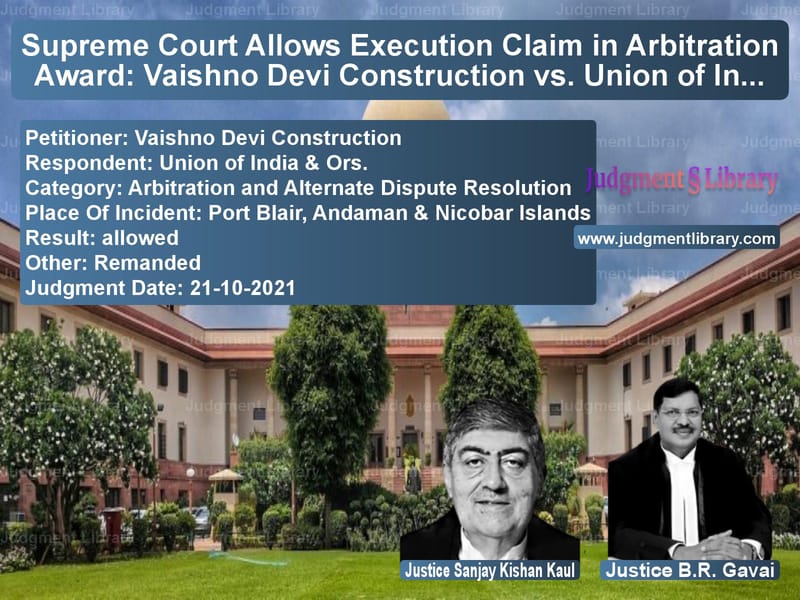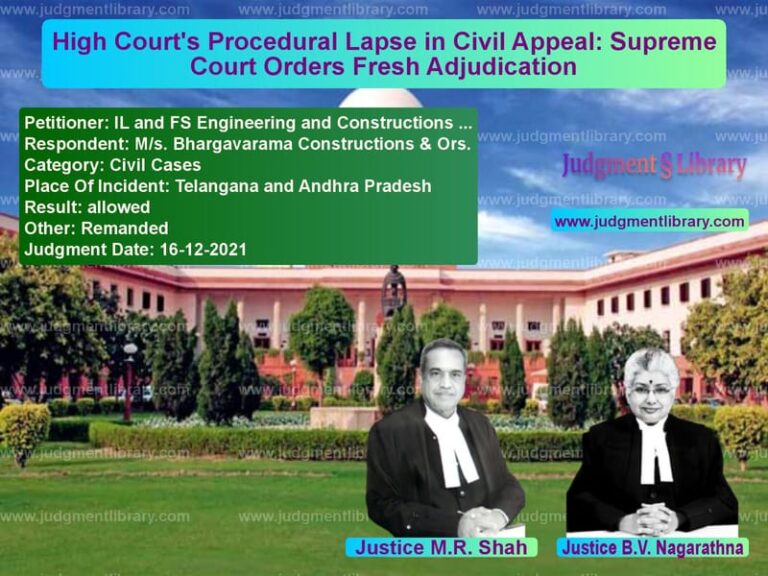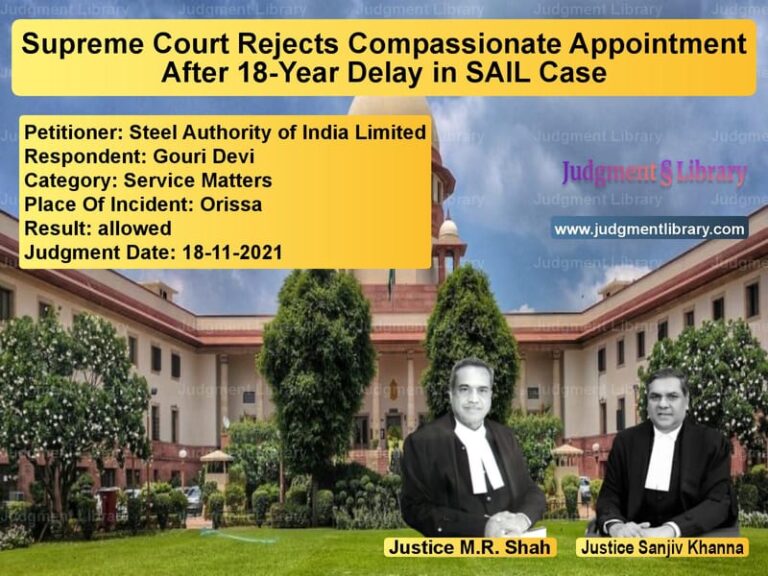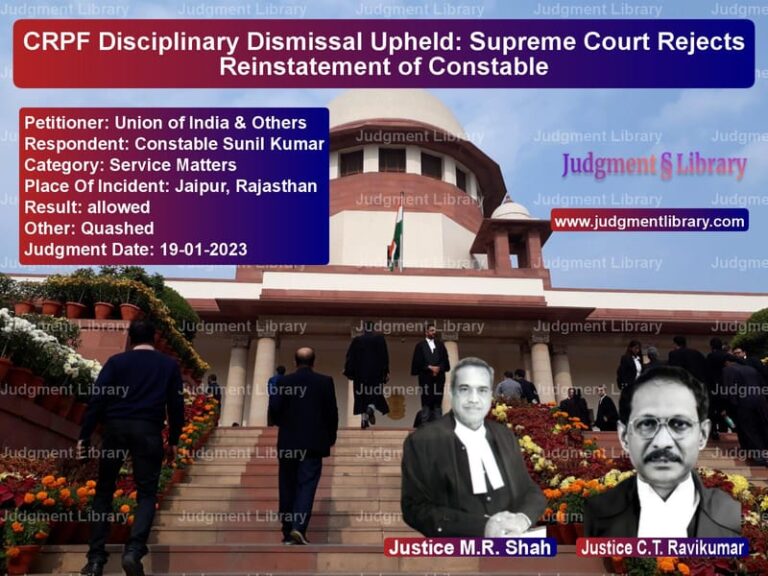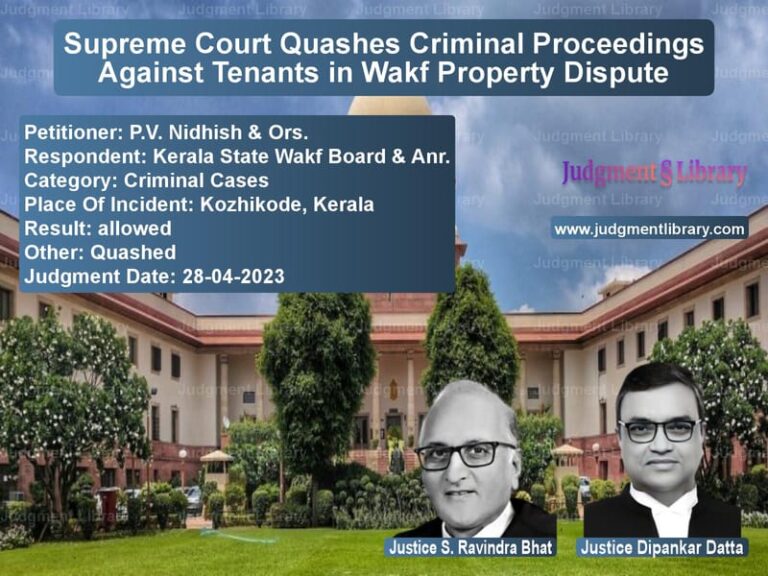Supreme Court Allows Execution Claim in Arbitration Award: Vaishno Devi Construction vs. Union of India
The Supreme Court of India, in its recent ruling in Vaishno Devi Construction vs. Union of India, addressed the issue of execution of an arbitration award where rights were claimed by an assignee of the original decree-holder. The case involved significant questions regarding the application of Order XXI Rule 16 of the Code of Civil Procedure (CPC) and the amendments made to it in 1976, which clarified the rights of decree-holders and assignees in execution proceedings.
This judgment is critical as it clarifies the rights of assignees to execute arbitration awards and determines the scope of objections that can be raised in execution proceedings.
Background of the Case
The case originated from a contract awarded on December 29, 1995, by the Union of India to a contractor, Surendra Nath Kanungo, for the extension of the runway at Port Blair Airport. The contractor allegedly assigned parts of the contract to Vaishno Devi Construction and another firm, BeeDee Builders. The dispute arose when payments for work done were allegedly withheld.
Surendra Nath Kanungo initiated arbitration proceedings, resulting in an award in his favor. However, during the execution of the award, Vaishno Devi Construction claimed rights over the decretal amount based on an assignment deed executed by Kanungo in 1999.
The District Judge at Port Blair rejected the objections filed by Vaishno Devi Construction under Section 47 of CPC, leading to an appeal before the Calcutta High Court, which also dismissed their claims. The case was then brought before the Supreme Court.
Petitioners’ Arguments
Vaishno Devi Construction contended that:
- They had an assignment deed executed by Surendra Nath Kanungo in 1999, entitling them to the arbitration award.
- Order XXI Rule 16 CPC, as amended in 1976, allowed execution by an assignee even if the assignment was made before the decree was passed.
- The rejection of their claims by lower courts was erroneous as it failed to consider their status as legal assignees.
Respondents’ Arguments
The Union of India and the legal representatives of Kanungo countered by stating that:
- The assignment deed was never disclosed until 2016, raising doubts about its authenticity.
- The decree was granted to Kanungo personally, and no valid transfer was proven.
- Execution proceedings cannot entertain disputed claims of assignment that should be pursued in a separate civil suit.
Supreme Court’s Legal Analysis
1. Interpretation of Order XXI Rule 16 CPC
The Supreme Court analyzed the legislative intent behind the 1976 amendment to Order XXI Rule 16 and held:
“The explanation inserted in 1976 clarifies that the provision does not affect Section 146 CPC, allowing a transferee of rights in property to apply for execution without a separate assignment of the decree.”
2. Right of Assignees in Execution Proceedings
The Court rejected the argument that assignees must file a separate suit to establish their rights and held:
“A transferee of rights in the subject matter of a suit may apply for execution without a separate assignment of the decree, provided there is prima facie evidence supporting the claim.”
3. Executing Court’s Role
The Supreme Court noted that the lower courts had wrongly dismissed the objections without properly examining the assignment deed:
“Instead of outright rejection, the executing court should have conducted an inquiry into the validity of the assignment claim.”
Judgment and Conclusion
The Supreme Court set aside the decisions of the lower courts and remanded the matter to the executing court for reconsideration. The key takeaways from this ruling include:
- Assignees of arbitration awards have a right to execution under Order XXI Rule 16 CPC.
- Execution proceedings must allow inquiry into assignment claims instead of outright rejection.
- The 1976 amendment to CPC facilitates execution by transferees of rights in property.
This ruling ensures clarity on execution proceedings involving assignees and prevents arbitrary dismissal of genuine claims in arbitration awards.
Judges: The judgment was delivered by Sanjay Kishan Kaul and B.R. Gavai.
Petition Result: Allowed
Petitioner Name: Vaishno Devi Construction.Respondent Name: Union of India & Ors..Judgment By: Justice Sanjay Kishan Kaul, Justice B.R. Gavai.Place Of Incident: Port Blair, Andaman & Nicobar Islands.Judgment Date: 21-10-2021.
Don’t miss out on the full details! Download the complete judgment in PDF format below and gain valuable insights instantly!
Download Judgment: vaishno-devi-constru-vs-union-of-india-&-ors-supreme-court-of-india-judgment-dated-21-10-2021.pdf
Directly Download Judgment: Directly download this Judgment
See all petitions in Arbitration Awards
See all petitions in Enforcement of Awards
See all petitions in Dispute Resolution Mechanisms
See all petitions in Judgment by Sanjay Kishan Kaul
See all petitions in Judgment by B R Gavai
See all petitions in allowed
See all petitions in Remanded
See all petitions in supreme court of India judgments October 2021
See all petitions in 2021 judgments
See all posts in Arbitration and Alternate Dispute Resolution Category
See all allowed petitions in Arbitration and Alternate Dispute Resolution Category
See all Dismissed petitions in Arbitration and Alternate Dispute Resolution Category
See all partially allowed petitions in Arbitration and Alternate Dispute Resolution Category

